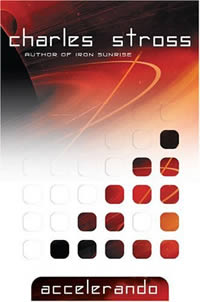 W
WAccelerando is a 2005 science fiction novel consisting of a series of interconnected short stories written by British author Charles Stross. As well as normal hardback and paperback editions, it was released as a free e-book under the CC BY-NC-ND license. Accelerando won the Locus Award in 2006, and was nominated for several other awards in 2005 and 2006, including the Hugo, Campbell, Clarke, and British Science Fiction Association Awards.
 W
WThe Age of Intelligent Machines is a non-fiction book about artificial intelligence by inventor and futurist Ray Kurzweil. This was his first book and the Association of American Publishers named it the Most Outstanding Computer Science Book of 1990. It was reviewed in The New York Times and The Christian Science Monitor. The format is a combination of monograph and anthology with contributed essays by artificial intelligence experts such as Daniel Dennett, Douglas Hofstadter, and Marvin Minsky.
 W
WThe Age of Spiritual Machines: When Computers Exceed Human Intelligence is a non-fiction book by inventor and futurist Ray Kurzweil about artificial intelligence and the future course of humanity. First published in hardcover on January 1, 1999 by Viking, it has received attention from The New York Times, The New York Review of Books and The Atlantic. In the book Kurzweil outlines his vision for how technology will progress during the 21st century.
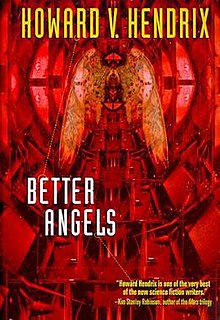 W
WBetter Angels is a science fiction novel by Howard V. Hendrix first published in 1999.
 W
WBlindsight is a hard science fiction novel by Canadian writer Peter Watts, published by Tor Books in 2006. It won the Seiun Award for best translated novel, and was nominated for the Hugo Award for Best Novel, the John W. Campbell Memorial Award for Best Science Fiction Novel, and the Locus Award for Best Science Fiction Novel. The novel follows a crew of astronauts sent out as the third wave, following two series of probes, to investigate a trans-Neptunian Kuiper belt comet dubbed 'Burns-Caulfield' that has been found to be transmitting an unidentified radio signal to an as-yet unknown destination elsewhere in the solar system, followed by their subsequent first contact. The novel explores questions of identity, consciousness, free will, artificial intelligence, neurology, game theory as well as evolution and biology.
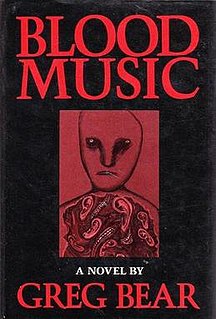 W
WBlood Music is a science fiction novel by American writer Greg Bear. It was originally published as a short story in 1983 in the American science fiction magazine Analog Science Fact & Fiction, winning the 1983 Nebula Award for Best Novelette and the 1984 Hugo Award for Best Novelette.
 W
WBrain Wave is a science fiction novel by American writer Poul Anderson, first published in serial form in Space Science Fiction in 1953, and then as a novel in 1954. Anderson had said that he could consider it one of his top five books. This is one of many science fiction works written at this time on the theme of heightened intelligence.
 W
WChildhood's End is a 1953 science fiction novel by the British author Arthur C. Clarke. The story follows the peaceful alien invasion of Earth by the mysterious Overlords, whose arrival begins decades of apparent utopia under indirect alien rule, at the cost of human identity and culture.
 W
WThe Children of the Sky is a science fiction novel by American writer Vernor Vinge. It is a direct sequel to A Fire Upon the Deep and shares the Zones of Thought universe with A Deepness in the Sky. Unlike A Fire Upon the Deep, the novel is set completely on the Tines' world. It was nominated for the 2012 Locus Award for Best Science Fiction Novel and the Prometheus Award.
 W
WCitizen Cyborg: Why Democratic Societies Must Respond to the Redesigned Human of the Future is a 2004 non-fiction book by bioethicist and sociologist James Hughes, which articulates democratic transhumanism as a socio-political ideology and program.
 W
WConnectome: How the Brain's Wiring Makes Us Who We Are (2012) is a book by Sebastian Seung. It introduces basic concepts in neuroscience and then elaborates on the field of connectomics, i.e., how to scan, decode, compare, and understand patterns in brain connectivity. The book concludes with musings on cryonics and mind uploading. It was selected by The Wall Street Journal as Top Ten Nonfiction of 2012.
 W
WDaemon and Freedom™ comprise a two-part novel by the author Daniel Suarez about a distributed, persistent computer application, the Daemon, that begins to change the real world after the original programmer's death.Daemon (2006) ISBN 978-0-9786271-0-2 paperback; (2009) hardcover re-release ISBN 978-0-525-95111-7 Freedom™ (2010) ISBN 978-0-525-95157-5
 W
WDiaspora is a hard science fiction novel by the Australian writer Greg Egan which first appeared in print in 1997. It originated as the short story "Wang's Carpets" which originally appeared in the Greg Bear-edited anthology New Legends. The story appears as a chapter of the novel.
 W
WDistress is a 1995 science fiction novel by Australian writer Greg Egan.
 W
WDown and Out in the Magic Kingdom is a 2003 science fiction book, the first novel by Canadian author and digital-rights activist Cory Doctorow. Concurrent with its publication by Tor Books, Doctorow released the entire text of the novel under a Creative Commons noncommercial license on his website, allowing the whole text of the book to be freely read and distributed without needing any further permission from him or his publisher.
 W
WEnding Aging: The Rejuvenation Breakthroughs that Could Reverse Human Aging in Our Lifetime is a 2007 book written by Aubrey de Grey, a biogerontologist, with his research assistant Michael Rae. Ending Aging describes de Grey's proposal for eliminating aging as a cause of debilitation and death in humans, and restoring the body to an indefinitely youthful state, a project plan that he calls the "strategies for engineered negligible senescence", or "SENS". De Grey argues that defeating aging is feasible, possibly within a few decades, and he outlines steps that can be taken to hasten the development of regenerative medicine treatments for each side of aging.
 W
WFall; or, Dodge in Hell is a 2019 speculative fiction novel by American author Neal Stephenson. The book explores mind uploading to the Cloud from the perspective of Richard "Dodge" Forthrast, a character introduced in Stephenson's 2011 Reamde.
 W
WFantastic Voyage: Live Long Enough to Live Forever is a book authored by Ray Kurzweil and Terry Grossman published in 2004. The basic premise of the book is that if middle aged people can live long enough, until approximately 120 years, they will be able to live forever—as humanity overcomes all diseases and old age itself. This might also be considered a break-even scenario where developments made during a year increase life expectancy by more than one year. Biogerontologist Aubrey de Grey called this the "Longevity escape velocity" in a 2005 TED talk.
 W
WA Fire Upon the Deep is a 1992 science fiction novel by American writer Vernor Vinge. It is a space opera involving superhuman intelligences, aliens, variable physics, space battles, love, betrayal, genocide, and a communication medium resembling Usenet. A Fire Upon the Deep won the Hugo Award in 1993, sharing it with Doomsday Book by Connie Willis.
 W
WFrankissstein: A Love Story is a 2019 novel by Jeanette Winterson. It was published on 28 May 2019 by Jonathan Cape. The novel employs speculative fiction and historical fiction to reimagine Mary Shelley's classic novel Frankenstein (1818). The story switches between Mary Shelley writing Frankenstein in Geneva, Switzerland in 1816 and the story of Ry Shelley, a transgender doctor and Victor Stein, a transhumanist, who become involved in the world of artificial intelligence and cryonics in present-day Brexit-era Britain.
 W
WFreedom™, the sequel to Daemon, is the second of a two-part novel, by the author Daniel Suarez, about a distributed, persistent computer application, known as The Daemon, that begins to change the real world after the original programmer's death.
 W
WGlasshouse is a science fiction novel by British author Charles Stross, first published in 2006. The novel is set in the twenty-seventh century aboard a spacecraft adrift in interstellar space. Robin, the protagonist, has recently had his memory erased. He agrees to take part in an experiment, during which he is placed inside a model of a late twentieth/early twenty-first century Euroamerican society. Robin is given a new identity and body, specifically that of a woman named "Reeve". Major themes of this novel are identity, gender determinism, self-image and conformity. Contrary to popular belief, it is not a sequel to his 2005 novel Accelerando, although Stross has stated that the two novels are not obviously incompatible. Glasshouse won the Prometheus Award for 2007, and was nominated for the Hugo, Campbell, and Locus Awards in 2007.
 W
WThe Godwhale is a science fiction novel by American novelist T. J. Bass, first published in 1974. It is the sequel to Half Past Human. The book was nominated for the Nebula Award for Best Novel in 1974. The novel deals with genetic and biological inventions with a strange and mystical twist.
 W
WGreat Mambo Chicken and the Transhuman Condition is a non-fiction book copyright 1990 by Ed Regis, an American author and educator, that presents a lighthearted look at scientific visionaries planning for a future with "post-biological" people, space colonization, nanotechnology, and cryonics. The book emphasizes the personality and projects of Robert Truax, Eric Drexler, Gerard K. O'Neill, Chris Langton, Freeman Dyson, Hans Moravec, Ralph Merkle, Robert Forward, Keith Henson, Carolyn Meinel, Gary Hudson, Saul Kent, and a number of others.
 W
WHarry Potter and the Methods of Rationality (HPMOR) is a Harry Potter fan fiction by Eliezer Yudkowsky. It adapts the story of Harry Potter to explain complex concepts in cognitive science, philosophy, and the scientific method. It was published as a serial from February 28, 2010 to March 14, 2015, totaling 122 chapters and about 660,000 words.
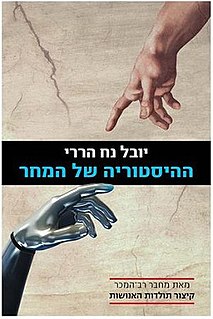 W
WHomo Deus: A Brief History of Tomorrow is a book written by Israeli author Yuval Noah Harari, professor at the Hebrew University in Jerusalem. The book was first published in Hebrew in 2015 by Dvir publishing; the English-language version was published in September 2016 in the United Kingdom and in February 2017 in the United States.
 W
WHow to Create a Mind: The Secret of Human Thought Revealed is a non-fiction book about brains, both human and artificial, by the inventor and futurist Ray Kurzweil. First published in hardcover on November 13, 2012 by Viking Press it became a New York Times Best Seller. It has received attention from The Washington Post, The New York Times and The New Yorker.
 W
WHuman Enhancement (2009) is a non-fiction book edited by philosopher Nick Bostrom and philosopher and bioethicist Julian Savulescu. Savulescu and Bostrom write about the ethical implications of human enhancement and to what extent it is worth striving towards.
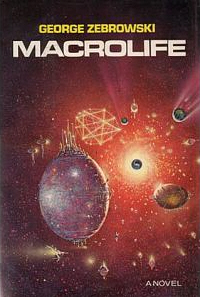 W
WMacrolife: A Mobile Utopia is a 1979 science fiction novel by American author George Zebrowski.
 W
WMarooned in Realtime is a 1986 murder mystery and time-travel science fiction novel by American writer Vernor Vinge, about a small, time-displaced group of people who may be the only survivors of a technological singularity or alien invasion. It is the sequel to the novel The Peace War (1984) and the novella The Ungoverned (1985). Both novels and the novella were collected in Across Realtime.
 W
WMemories with Maya is a hard science fiction novel by the author Clyde Dsouza. It has been received well by the transhumanism and the science community. The novel looks at how augmented reality and AI will merge to augment human beings in ways that will affect emotions, intimate human relationships, and our evolution as a species.
 W
WThe Metamorphosis of Prime Intellect is a 1994 novella by Roger Williams, a programmer living in New Orleans. It deals with the ramifications of a powerful, superintelligent supercomputer that discovers god-like powers to alter reality while studying a quirk of quantum physics discovered during the prototyping of its own specialised processors, ultimately heralding a technological singularity. After remaining unpublished for years, the novel was published online in 2002, hosted by Kuro5hin; Williams later published a print edition via print-on-demand publisher Lulu. One reviewer called the novel "a well-written and very creative, if flawed, piece of work" and ranked it as one of the more important works of fiction to deal with the idea of a technological singularity.
 W
WOur Posthuman Future: Consequences of the Biotechnology Revolution is a 2002 book by Francis Fukuyama. In it, he discusses the potential threat to liberal democracy that use of new and emerging biotechnologies for transhumanist ends poses.
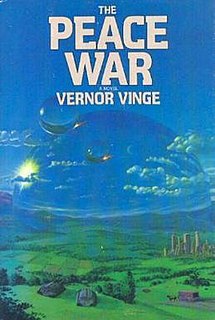 W
WThe Peace War is a science fiction novel by American writer Vernor Vinge, about authoritarianism and technological progress. It was first published as a serial in Analog in 1984, and then appeared in book form shortly afterward. It was nominated for the Hugo Award for Best Novel in 1985. Its sequels are "The Ungoverned", which was a novella published in his collection True Names and Other Dangers, and the novel Marooned in Realtime. The Peace War and Marooned in Realtime were collected in Across Realtime.
 W
WPermutation City is a 1994 science-fiction novel by Greg Egan that explores many concepts, including quantum ontology, through various philosophical aspects of artificial life and simulated reality. Sections of the story were adapted from Egan's 1992 short story "Dust", which dealt with many of the same philosophical themes. Permutation City won the John W. Campbell Award for the best science-fiction novel of the year in 1995 and was nominated for the Philip K. Dick Award the same year. The novel was also cited in a 2003 Scientific American article on multiverses by Max Tegmark.
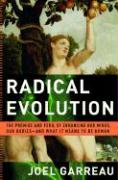 W
WRadical Evolution: The Promise and Peril of Enhancing Our Minds, Our Bodies—and What It Means to Be Human (ISBN 0-385-50965-0) is a book published in 2005 by Joel Garreau.
 W
WThe Rapture of the Nerds is a 2012 novel by Cory Doctorow and Charles Stross. It was released on September 4, 2012 through Tor Books and as an ebook, DRM free, under the CC BY-NC-ND. The book can also be downloaded for free.
 W
WRemnants is a series of science fiction books written by K. A. Applegate and published between July 2001 and September 2003. It is the story of what happens to the survivors of a desperate mission to save a handful of human beings after an asteroid collides with the Earth. Eighty people are placed aboard a converted space shuttle using untested "quack" hibernation technology and fired blindly into space hours before all life on Earth is obliterated by a large asteroid called The Rock. They are then picked up by a large, sentient space craft of monumental proportions known as 'Mother' which is inhabited by various races. 'Mother' can manipulate the physical environment within the craft's limits and often does so. Only a few people placed in stasis actually were alive and capable of being reanimated when they reached 'Mother'.
 W
WSchild's Ladder is a 2002 science fiction novel by Australian author Greg Egan. The book derives its name from Schild's ladder, a construction in differential geometry, devised by the mathematician and physicist Alfred Schild.
 W
WSchismatrix is a science fiction novel by Bruce Sterling, originally published in 1985. The story was Sterling's only novel-length treatment of the Shaper/Mechanist universe. Five short stories preceded the novel and are published together with it in a 1996 edition entitled Schismatrix Plus. Schismatrix was nominated for the Nebula Award for Best Novel in 1985, and the British Science Fiction Award in 1986.
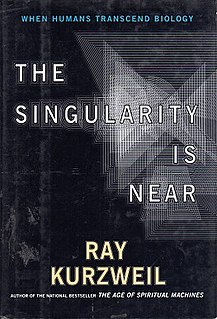 W
WThe Singularity Is Near: When Humans Transcend Biology is a 2005 non-fiction book about artificial intelligence and the future of humanity by inventor and futurist Ray Kurzweil.
 W
WSingularity Sky is a science fiction novel by author Charles Stross, published in 2003. It was nominated for the Hugo Award for Best Novel in 2004. A sequel, Iron Sunrise, was published that same year. Together the two are referred to as the Eschaton novels, after a near-godlike intelligence that exists in both.
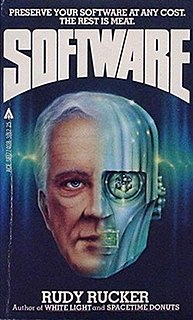 W
WSoftware is a 1982 cyberpunk science fiction novel written by Rudy Rucker. It won the first Philip K. Dick Award in 1983. The novel is the first book in Rucker's Ware Tetralogy, and was followed by a sequel, Wetware, in 1988.
 W
WThe Star Fraction is a science fiction novel by Scottish writer Ken MacLeod, his first one, published in 1995. The major themes are radical political thinking, a functional anarchist microstate, oppression, and revolution. The action takes place in a balkanized UK, about halfway into the 21st century. The novel was nominated for the Arthur C. Clarke Award in 1996.
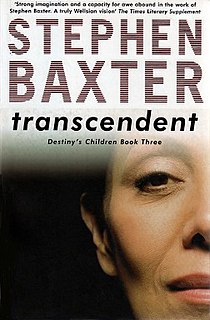 W
WTranscendent is the third novel in the Destiny's Children series by Stephen Baxter, and a 2006 Campbell Award nominee.
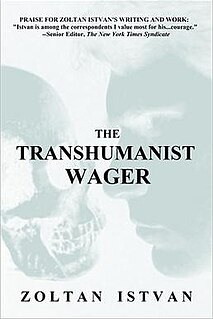 W
WThe Transhumanist Wager is a 2013 science fiction novel by American author Zoltan Istvan. The novel follows the life of Jethro Knights, a philosopher whose efforts to promote transhumanism ultimately lead to a global revolution. It was a first-place winner in visionary fiction at the International Book Awards.
 W
WThe Ware Tetralogy is a series of four science fiction novels by author Rudy Rucker: Software (1982), Wetware (1988), Freeware (1997) and Realware (2000).